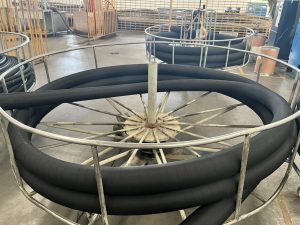Chemical resistant hoses play a critical role in various industries where the transportation of acids, alkalis, and other corrosive chemicals is required. These hoses are specially designed to withstand the harsh effects of corrosive substances, ensuring the safety and efficiency of chemical transfer operations. This article aims to provide an overview of chemical resistant hoses, highlighting their applications, key features, and benefits in industries that deal with the transportation of corrosive chemicals.
Chemical resistant hoses, also known as acid and alkali hoses, are flexible tubes made from a range of materials that offer exceptional resistance to corrosive chemicals. These hoses are engineered to prevent chemical reactions between the transported substances and the hose material, ensuring the integrity of the transfer process. They are available in various sizes and configurations to suit different application requirements.
Versatility in applications
Chemical resistant hoses find application in numerous industries, including chemical manufacturing, oil and gas, pharmaceuticals, agriculture, and water treatment. These hoses are used for the safe transportation of acids, alkalis, solvents, and other corrosive chemicals. They are commonly employed in chemical plants, refineries, laboratories, and industrial facilities where the handling and transfer of hazardous substances are integral to operations.

Key features and benefits
Chemical resistant hoses offer several key features that contribute to their effectiveness and reliability. Firstly, they are constructed from materials such as PVC, EPDM, or Teflon, which exhibit exceptional resistance to corrosive substances. This resistance ensures that the hose will not degrade or corrode when in contact with the transported chemicals. Additionally, chemical resistant hoses are engineered to handle high pressure and temperature, making them suitable for a wide range of applications. Their flexibility allows for easy installation and maneuverability, while their smooth inner lining minimizes flow resistance and prevents the accumulation of chemicals within the hose.
Maintenance and safety considerations
Regular maintenance and proper handling practices are essential for the safe and reliable use of chemical resistant hoses. Regular inspections should be conducted to identify signs of wear, damage, or degradation that may compromise the hose’s performance. Hoses should be stored in a cool and dry environment away from direct sunlight and extreme temperatures. Operators should also follow recommended installation procedures and safety guidelines to prevent accidents and ensure the longevity of chemical resistant hoses.
Chemical resistant hoses are indispensable in industries that deal with the transportation of corrosive chemicals. Their ability to resist acids, alkalis, and other corrosive substances makes them vital for safe and efficient chemical transfer operations. Whether in chemical plants, refineries, or laboratories, chemical resistant hoses provide the necessary durability, flexibility, and reliability to handle a wide range of corrosive chemicals. By adhering to maintenance and safety protocols, operators can ensure the longevity and effectiveness of these hoses, ultimately enhancing the safety and productivity of their operations.